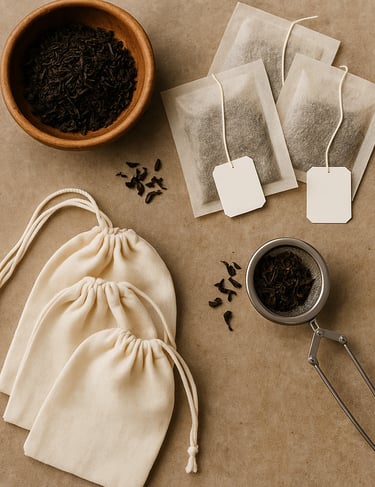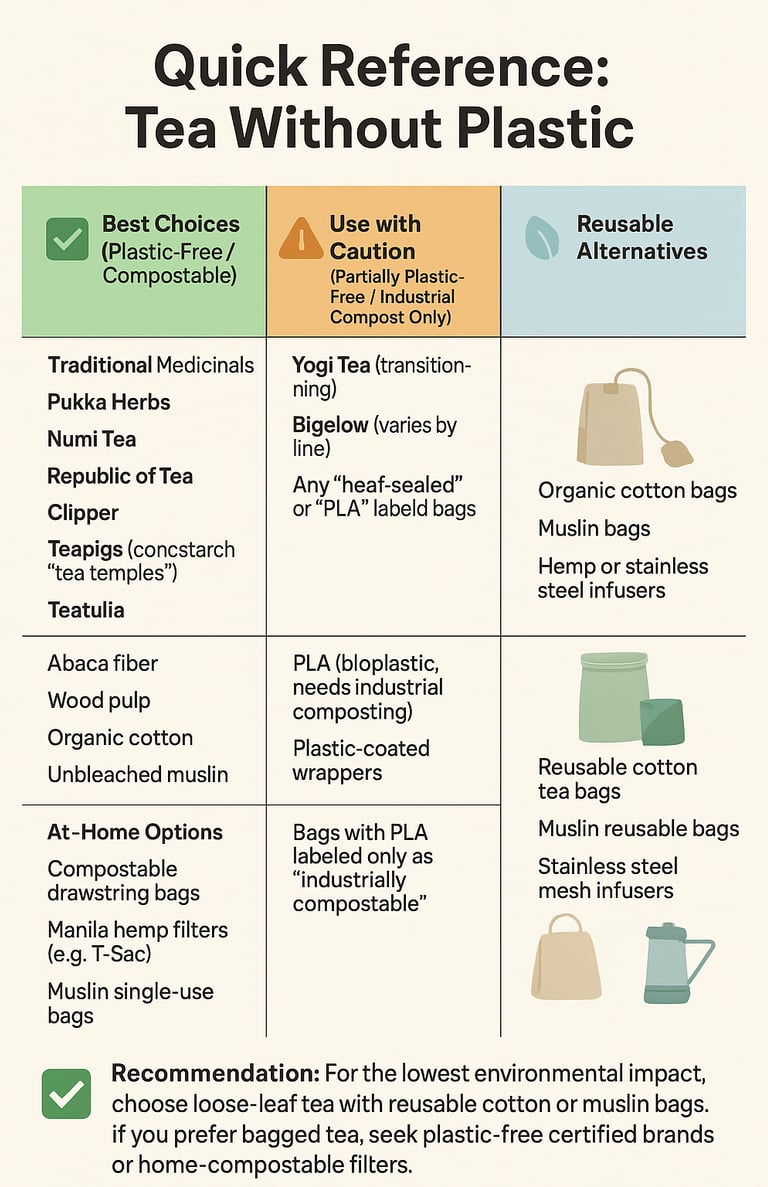Tea is the second-most consumed beverage worldwide after water, with more than 3 billion cups enjoyed daily. In the United States alone, approximately 159 million people drink tea each day. While tea is often associated with natural and health-conscious living, the packaging used for tea bags tells a more complex story.
Many conventional tea bags incorporate polypropylene or other polymers to seal the paper fibers and maintain shape. When steeped in boiling water, these plastics can shed billions of micro- and nanoplastic particles per cup (McGill University, 2019). Beyond direct ingestion, plastic-containing tea bags contribute to persistent waste streams that resist decomposition.
Plastic in Tea Bags: A Review of Findings and Sustainable Alternatives
Interesting Facts


Findings:
Use of Plastics in Tea Bags
Heat sealing: Most “paper” tea bags are reinforced with polypropylene or polyethylene to prevent disintegration.
Outer packaging: Even brands advertising plastic-free bags may use plastic-coated wrappers or envelopes.
Bioplastics (PLA): Some companies use PLA (polylactic acid), a plant-based polymer. While technically compostable, it requires industrial facilities and does not break down in home composting environments.
Brands Moving Toward Plastic-Free Options
Independent sustainability audits and brand disclosures highlight several tea companies with initiatives toward plastic-free and compostable products:
Traditional Medicinals – 100% plastic-free in many lines, using abaca fiber and wood pulp.
Pukka Herbs – Fully compostable bags with organic strings, no staples, no plastic.
Numi Tea – Compostable and plastic-free.
The Republic of Tea – Marketed as “plastic-free, compostable.”
Yogi Tea – Transitioning to full plastic-free; some compostable bags currently available.
Bigelow – Reported to use plastic-free or compostable materials in some lines.
Clipper – Organic, unbleached, plant-based biodegradable bags.
Teapigs – “Tea temples” made from cornstarch-based material, designed for composting.
Teatulia – Uses compostable corn silk and eucalyptus/aspen-based wrappers.
Caveats
Not all product lines within these brands are fully plastic-free.
Certification labels (e.g., “Plastic Free Certified,” “OK Compost HOME”) are more reliable than general marketing claims.
Consumers without access to municipal or industrial composting may find “compostable” PLA bags behave like plastic in practice.


Recommendations:
For Consumers
Prefer certified plastic-free brands such as Traditional Medicinals, Pukka Herbs, or Numi Tea when buying bagged tea.
Choose loose-leaf tea with reusable filters (cotton, muslin, hemp, or stainless steel) to eliminate single-use bags. Options include:
Organic Cotton Reusable Tea Bags (washable, $30).
Large Cotton Reusable Tea Bags (larger format, $7.99).
Unbleached Cotton Muslin Reusable Bags (breathable muslin, $9.95).
If convenience is essential, opt for home-compostable drawstring or paper bags, such as T-Sac Natural Manila Hemp filters.
Check packaging carefully: Avoid heat-sealed bags without disclosure of materials. Seek independent compostability certifications.
For Industry
Phase out polypropylene and polyethylene from all tea bag formats.
Adopt transparent labeling that distinguishes between “industrially compostable” and “home compostable.”
Expand reusable options alongside single-use alternatives, encouraging circular consumption models.
Sources
McGill University (2019). Plastic teabags release billions of microparticles and nanoparticles into tea. Environmental Science & Technology.
Transforming small business consulting with dynamic energy.
Service
Trust
(312) 220-9200
© 2025. All rights reserved.


141 W. Jackson Blvd. | Suite 1502 | Chicago, IL | 60604






